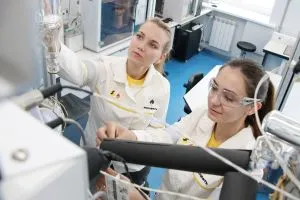AI Is Accelerating Breakthroughs in Russian Chemistry
Russian chemists are using artificial intelligence to predict the properties of new compounds, cutting years off the discovery of advanced materials for displays and medicines.

Researchers at the Zelinsky Institute of Organic Chemistry, part of the Russian Academy of Sciences, have built and deployed two machine-learning systems that can design molecules with specific properties—bypassing the slow trial-and-error stage.
The innovation was showcased to students during a tour of the institute’s Color Center, as reported by Scientific Russia.
This is the first AI system of its kind for discovering efficient organic emitters—compounds that are critical to producing modern OLED displays. Trained on an extensive database of experimental results, the algorithm can predict with about 80% accuracy the color and brightness of a molecule’s emission.
Researchers have already synthesized the first compound suggested by the neural network and confirmed its properties.
A second program developed at the institute targets potential anti-cancer drugs. Its accuracy is even higher thanks to a larger training dataset. The system can design molecules with adjustable cytotoxicity—the ability to kill cells—including forms activated by light.
By integrating AI, Russian chemists are redefining how research is done. Instead of synthesizing thousands of molecules manually, scientists can now focus on testing the most promising candidates identified by the algorithms. The shift saves months or even years of work, reduces costs, and speeds up the arrival of breakthrough technologies—from energy‑efficient gadgets to next‑generation pharmaceuticals.









































